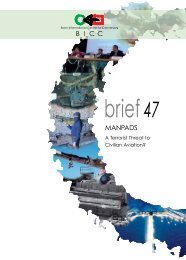egypt-final-presidential-elections-2012
egypt-final-presidential-elections-2012
egypt-final-presidential-elections-2012
Create successful ePaper yourself
Turn your PDF publications into a flip-book with our unique Google optimized e-Paper software.
The Carter Center<br />
Presidential Election in Egypt<br />
that constitute this legal framework include the<br />
following: 28<br />
The Constitutional Declaration of March 30, 2011:<br />
The Constitutional Declaration is widely seen as<br />
having replaced Egypt’s previous constitution, ratified<br />
in 1971. Noteworthy provisions in the declaration<br />
include Article 28, which provides for the establishment<br />
and composition of the PEC, the body charged<br />
with administering the <strong>presidential</strong> election. It also<br />
states that the decisions of the commission are <strong>final</strong><br />
and may not be stopped or canceled by any other<br />
authority, effectively granting the PEC extraordinary<br />
authority. In barring any possibility of appeal, even<br />
in those cases that could violate an Egyptian citizen’s<br />
fundamental right to vote or to equal suffrage for<br />
example, Article 28 is inconsistent with Egypt’s<br />
international obligations. 29<br />
As noted, on the evening of June 17, <strong>2012</strong>, the<br />
second and <strong>final</strong> day of polling for the second round<br />
of the <strong>presidential</strong> election, the SCAF unilaterally<br />
issued several amendments to the Constitutional<br />
Declaration that sharply curtailed the president’s<br />
authority over the military and enhanced the SCAF’s<br />
potential role in overseeing the appointment and<br />
work of the constituent assembly, the body designated<br />
by the Constitutional Declaration to draft a<br />
new, permanent constitution to be voted upon in a<br />
national referendum. 30<br />
Law Regulating the Presidential Election: 31 As<br />
the primary law governing the <strong>presidential</strong> electoral<br />
process, this law was originally enacted under the<br />
Mubarak regime in 2005 in response to calls for<br />
a multicandidate <strong>presidential</strong> election in Egypt. 32<br />
Prior to the election, first the SCAF as the interim<br />
lawmaking authority, and later the People’s Assembly,<br />
amended the law significantly. 33<br />
The law includes sections on candidate eligibility,<br />
nomination procedures, the timeline for publishing a<br />
provisional candidate list, challenges and appeals to<br />
candidates on the list, campaign activity restrictions,<br />
and campaign donation and expenditure limitations.<br />
It includes language on the structure and authority<br />
of the PEC, including the PEC’s authority to form<br />
district-level general committees (DGCs) of judges,<br />
which, in turn, supervise judges overseeing polling<br />
and counting operations. Reflecting Article 28 of the<br />
Constitutional Declaration, the law also includes a<br />
provision stating that the PEC’s decisions are “<strong>final</strong>,<br />
self-enforcing, and incontestable by any means and<br />
before any body whatsoever.” 34<br />
Presidential Election Commission Decisions: The<br />
PEC may issue decisions as it deems necessary to<br />
regulate its work and to exercise its competencies. 35<br />
The PEC published a total of 21 regulatory decisions<br />
on its website. 36 Key regulatory decisions cover the<br />
establishment of the voter database, campaign and<br />
campaign finance limitations, out-of-country voting<br />
28 In addition to the laws cited below, other laws played an important<br />
role within Egypt’s <strong>presidential</strong> electoral legal framework. The Law on<br />
the Exercise of Political Rights (No. 73 of 1956, as amended) was a key<br />
component of the parliamentary electoral legal framework in 2011 and<br />
<strong>2012</strong>. For the <strong>presidential</strong> election, however, the Law Regulating the<br />
Presidential Election appeared to supersede many sections of this law.<br />
The Law on the Exercise of Political Rights did determine the conditions<br />
for voter eligibility for the <strong>presidential</strong> election, as was the case during<br />
the parliamentary electoral process. Other important laws related to the<br />
electoral legal framework include the Law on Nongovernmental Societies<br />
and Organizations (Law Number 84 of 2002, as amended), which governs<br />
the registration of and operation of different types of domestic and<br />
international civil society organizations operating in Egypt, and the Law<br />
on Political Parties (Law Number 40 of 1977, as amended).<br />
29 U.N., ICCPR, Article 2(3); AU, African Union Declaration on<br />
the Principles Governing Democratic Elections in Africa, para. 3; AU,<br />
African Charter on Human and Peoples’ Rights, Article 7<br />
30 In yet another surprising development, President Morsi issued on Aug.<br />
12, <strong>2012</strong>, a constitutional addendum of his own that abrogated the terms<br />
of the SCAF’s June 17 amendments and that, effectively, replaced the<br />
SCAF with the office of the president as the legislative authority and as<br />
the authority responsible for selecting a new constituent assembly in the<br />
event the existing constituent assembly could not fulfill its duties.<br />
31 No. 174 of 2005, as amended<br />
32 Prior to 2005, presidents ran unopposed in a referendum-like format,<br />
with Egyptians voting for or against a single candidate.<br />
33 In accordance with Article 28 of the Constitutional Declaration, the<br />
Supreme Constitutional Court had the authority to review laws governing<br />
the <strong>presidential</strong> election prior to enactment and modified or nullified<br />
some amendments to the law offered by the SCAF and the People’s<br />
Assembly.<br />
34 Article 8, Law Regulating the Presidential Election<br />
35 Article 7, Law Regulating the Presidential Election<br />
36 In addition to the 21 regulatory decisions published on the website,<br />
the PEC published one PEC <strong>presidential</strong> Decision No. 4 regarding the<br />
composition of a media-monitoring committee.<br />
19



